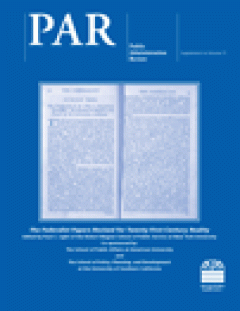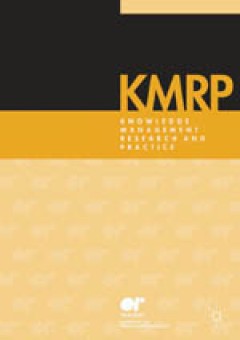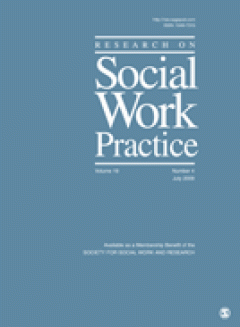Filter by

Federalist No. 76 : Does the Presidential Appointments Process Guarantee Cont…
Federalist No. 76 describes the process for appointing the top officers of government, which was seen as essential for recruiting the aptitude and tendency toward good administration. This essay examines the process as it has evolved into a series of Herculean tests of political endurance. Having illuminated the founders’ basic intent for expeditious and honorable appointments, the analysis pro…
- Edition
- Vol 71, Issue Suppl s1, Dec 2011, pp s148–s154
- ISBN/ISSN
- 00333352
- Collation
- -
- Series Title
- Public Administration Review
- Call Number
- -

Federalist No. 85 : Has the National Government Become an “Awful Spectacle”?
Federalist No. 85 offers a synopsis of the overall case for the Constitution. Describing the dangers of a nation without a national government as an “awful spectacle,” the paper provides a rebuttal to the active opposition to ratification. Focusing entirely on the operations of government, this essay examines contemporary challenges to faithfully executing the laws and offers an analysis of com…
- Edition
- Vol 71, Issue Suppl s1, pp s155–s159, Dec 2011
- ISBN/ISSN
- 00333352
- Collation
- -
- Series Title
- Public Administration Review
- Call Number
- -

Managing knowledge assets in a complex business landscape : the relevance of …
In today's complex business landscape it is critical to identify and understand what are the knowledge-based value drivers affecting business value creation. This paper focuses on the relevance of the emotive knowledge as a key knowledge asset shaping organisational capabilities of 21st century organisations. The concept of emotive knowledge is analysed in accordance with a twofold perspective.…
- Edition
- Vol 9, Number 4,December 2011, pp, 279–285
- ISBN/ISSN
- 14778238
- Collation
- -
- Series Title
- Knowledge Management Research & Practice
- Call Number
- -

The impact of outsourcing strategies on companies’ intellectual capital
The aim of the paper is to analyse the effect of outsourcing on the intellectual capital of firms in the current turbulent environment. In particular, the paper will analyse the difference between cost-driven and strategic-driven outsourcing and their impact on human and organisational/relational capital. In addition, the paper will stress the differences in outsourcing of manufacturing and ser…
- Edition
- Vol. 9, No. 4, December 2011,pp, 286–292
- ISBN/ISSN
- 14778238
- Collation
- -
- Series Title
- Knowledge Management Research & Practice
- Call Number
- -

Relational capital inside multinationals
Linking the knowledge-based view, the multinational theory and the intellectual capital-based view of the firm, this paper seeks to identify the main activities belonging to the relational capital of multinationals and the extent to which they contribute to knowledge development and transfer between their different subsidiaries. Six multinational and knowledge-intensive firms placed in Spain ha…
- Edition
- Vol. 9, No. 4, December 2011, pp. 293–304
- ISBN/ISSN
- 14778238
- Collation
- -
- Series Title
- Knowledge Management Research & Practice
- Call Number
- -

Market extension and knowledge management strategies of knowledge-intensive b…
The paper aims at analysing the relationship between the market extension of Knowledge-Intensive Business Services (KIBS) and their knowledge management strategies. The literature emphasizes the strong relationship existing between KIBS and their customers in terms of innovation process and knowledge creation. We argue that the knowledge management strategies – in terms of knowledge codificatio…
- Edition
- Vol. 9, No. 4, December 2011,pp. 305–314
- ISBN/ISSN
- 14778238
- Collation
- -
- Series Title
- Knowledge Management Research & Practice
- Call Number
- -

Knowledge-intensity as an organisational characteristic
The sector of knowledge-intensive business services (KIBS) has a central role in modern economies. However, there are no explicit and generally acknowledged criteria for characterising KIBS or other knowledge-intensive organisations. In addition, the concept of knowledge-intensity has no significant managerial use. This paper aims to widen the existing understanding about the concept of knowled…
- Edition
- Vol. 9, No. 4, December 2011,pp. 315–326
- ISBN/ISSN
- 14778238
- Collation
- -
- Series Title
- Knowledge Management Research & Practice
- Call Number
- -

A model for assessing the coherence of companies’ knowledge strategy
This paper proposes a strategic model for assessing the coherence between companies’ knowledge strategies and their business strategies as well as in their competitive and organisational contexts. In analysing knowledge management literature, we locate three principal strategies: (1) knowledge development (internal or external), (2) knowledge sharing (codification or personalisation) and (3) kn…
- Edition
- Vol. 9, No. 4, December 2011,pp. 327–341
- ISBN/ISSN
- 14778238
- Collation
- -
- Series Title
- Knowledge Management Research & Practice
- Call Number
- -

Intellectual capital and knowledge sharing : the mediating role of organisati…
Healthcare organisations are facing the constant trade off to contain expenditures without sacrificing the quality of patient's care. This challenge to do ‘more with less’ induced healthcare executives to heavily invest in innovations activities in order to increase the efficiency of their organisations. By taking an individual-level perspective, our study focuses on knowledge-sharing behaviour…
- Edition
- Vol. 9, No. 4, December 2011,pp. 342–352
- ISBN/ISSN
- 14778238
- Collation
- -
- Series Title
- Knowledge Management Research & Practice
- Call Number
- -

Unravelling the dynamics of knowledge creation in communities of practice tho…
Drawing on a longitudinal case study of Alpha Chemicals, we use four complexity theory constructs – adaptive tension, enabling leadership, enhanced cooperation, and boundary spanning – to explain the continuous knowledge creation dynamics in Communities of practice (CoPs). Our findings show that the virtual cycle of knowledge creation results from CoPs oscillating between guided and self-direct…
- Edition
- Vol. 9, No. 4, December 2011,pp. 353–366
- ISBN/ISSN
- 14778238
- Collation
- -
- Series Title
- Knowledge Management Research & Practice
- Call Number
- -

Absorptive capacity : a proposed operationalization
The concept of absorptive capacity has already been considerably studied from a theoretical perspective, but few, if any, attempts at operationalizing the concept have been studied in ways that would allow its full assessment. The more specific focus provided by the four dimensions identified in some recent literature – acquisition, assimilation, transformation and exploitation – opens up some …
- Edition
- Vol. 9, No. 4, December 2011,pp. 367–377
- ISBN/ISSN
- 14778238
- Collation
- -
- Series Title
- Knowledge Management Research & Practice
- Call Number
- -

Toward Valuation in Social Work and Social Services
Social work and social services are known to be beneficial to society, but to date no systematic valuation of their contribution has been attempted. The aim of this article is to advance our ability to quantify both the known direct benefits and some of the positive externalities of social work. The authors make the case of why valuation is important for social work and social services. Relying…
- Edition
- Vol. 21 no. 4, July 2011,pp. 388-396
- ISBN/ISSN
- 10497315
- Collation
- -
- Series Title
- Research on Social Work Practice
- Call Number
- -

Is Social Work Advocacy Worth the Cost? Issues and Barriers to an Economic An…
Advocacy is central to the social work profession’s commitment to social betterment and justice, yet much of what we know about it is based on conventional wisdom. We have little evidence on the effectiveness of interventions and even less on the costs and benefits of advocacy campaigns. This article discusses some of the conceptual and methodological issues involved with advocacy research and …
- Edition
- Vol. 21 no. 4, July 2011,pp. 397-403
- ISBN/ISSN
- 10497315
- Collation
- -
- Series Title
- Research on Social Work Practice
- Call Number
- -

Using Common Themes : Cost-Effectiveness of Permanent Supported Housing for P…
This article examines the cost-effectiveness of providing permanent supported housing to homeless people with mental illness. Through the use of billing records and frequency of use charts, researchers were able to map the service usage of a cohort of 268 homeless individuals from both urban and rural communities. The results suggest that significant cost savings can be achieved by establishing…
- Edition
- Vol. 21 no. 4, July 2011.pp. 404-411
- ISBN/ISSN
- 10497315
- Collation
- -
- Series Title
- Research on Social Work Practice
- Call Number
- -

Volunteering and Volunteers : Benefit-Cost Analyses
This article examines the phenomenon of volunteering from a benefit—cost perspective. Both the individual making a decision to volunteer and the organization making a decision to use volunteer labor face benefits and costs of their actions, yet these costs and benefits almost always remain unarticulated, perhaps because the common perception of the do-good volunteer who contributes his or her l…
- Edition
- Vol. 21 no. 4, July 2011.pp. 412-420
- ISBN/ISSN
- 10497315
- Collation
- -
- Series Title
- Research on Social Work Practice
- Call Number
- -

Valuation of Drug Abuse : A Review of Current Methodologies and Implications …
This article reviews the use of several valuation methods as they relate to drug abuse and places them within the context of U.S. policy. First, cost-of-illness (COI) studies are reviewed and their limitations discussed. Second, three additional economic methods of valuing drug abuse are reviewed, including cost—effectiveness analysis (CEA), benefit—cost analysis (BCA) and willingness-to-pay (W…
- Edition
- Vol. 21 no. 4, July 2011,pp. 421-431
- ISBN/ISSN
- 10497315
- Collation
- -
- Series Title
- Research on Social Work Practice
- Call Number
- -

Parenting Training for Intellectually Disabled Parents : A Cochrane Systemati…
Objectives: This article presents a Cochrane/Campbell systematic review of the evidence on the effect of parent training to support the parenting of parents with intellectual disabilities. Method: Randomized controlled trials (RCTs) comparing parent training interventions for parents with intellectual disability with usual care or with a control group were included in the review. Outcomes: The …
- Edition
- Vol. 21 no. 4, July 2011,pp. 432-441
- ISBN/ISSN
- 10497315
- Collation
- -
- Series Title
- Research on Social Work Practice
- Call Number
- -

Parental Self-Efficacy and Joining a Savings Program for Children’s Education
Objectives: Using baseline survey data, the study examined self-efficacy of 381 lower-income parents who had opportunities to build financial assets for their children by opening college savings accounts in a human service agency. Methods: Of the study sample, 62% of the parents decided to open accounts while 38% did not. Structural equation modeling for multiple group models was performed. Res…
- Edition
- Vol. 21 no. 4, July 2011,pp. 442-451
- ISBN/ISSN
- 10497315
- Collation
- -
- Series Title
- Research on Social Work Practice
- Call Number
- -

Training in Structured Diagnostic Assessment Using DSM-IV Criteria
Objectives: Determining a patient’s psychiatric diagnosis is an important first step for the selection of empirically supported treatments and a critical component of evidence-based practice. Structured diagnostic assessment covers the range of psychiatric diagnoses and is usually more complete and accurate than unstructured assessment. Method: We conducted a national survey of training in empi…
- Edition
- Vol. 21 no. 4, July 2011,pp. 452-457
- ISBN/ISSN
- 10497315
- Collation
- -
- Series Title
- Research on Social Work Practice
- Call Number
- -

The Columbia Impairment Scale : Factor Analysis Using a Community Mental Heal…
Objective: The objective of this study was to test the factor structure of the parent version of the Columbia Impairment Scale (CIS) in a sample of mothers who brought their children for community mental health (CMH) services (n = 280). Method: Confirmatory factor analysis (CFA) was used to test the fit of the hypothesized four-factor structure and the empirically validated one-factor structure…
- Edition
- Vol. 21 no. 4, July 2011,pp. 458-468
- ISBN/ISSN
- 10497315
- Collation
- -
- Series Title
- Research on Social Work Practice
- Call Number
- -
 Computer Science, Information & General Works
Computer Science, Information & General Works  Philosophy & Psychology
Philosophy & Psychology  Religion
Religion  Social Sciences
Social Sciences  Language
Language  Pure Science
Pure Science  Applied Sciences
Applied Sciences  Art & Recreation
Art & Recreation  Literature
Literature  History & Geography
History & Geography